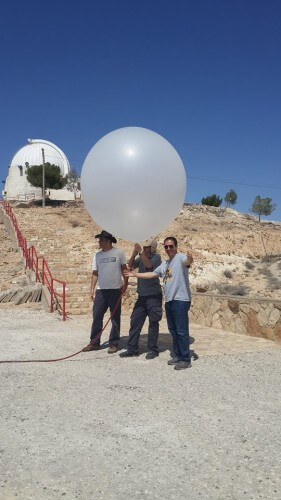Today (Wednesday) at 11:30 GMT 5 meteorological balloons from different locations in Europe, Russia and Israel will be released as part of an experiment led by Prof. Yoav Yair from the Herzliya Interdisciplinary Center

This week on Wednesday (October 22) at 11:30 GMT, 5 high-altitude meteorological balloons will be simultaneously released from five different sites in Europe, Russia and Israel. The balloons carry cosmic ray detectors, which measure the ionization rate from cosmic rays as a function of altitude. In this way, a wide-spread picture of the electrical condition of the atmosphere will be obtained from the ground up to a height of 35 km (this is the maximum height the balloons can reach). This is the first time that flowering is carried out on such an extensive international scale.
The launch in Israel will be carried out from the Wiz observatory in Mitzpe Ramon. The University of Reading will launch a balloon from the West Campus to London at the same time as two balloons to be launched by the Lebedev Institute from Murmansk (Siberia) and Moscow. The fifth balloon will be launched by the Israeli company Spacecialist from the Barcelona area in Spain - and it will also drop the test array, which will be collected from the ground by a "pursuit team" of the Spanish company zero2infinity that operates the balloon, which will identify the landing location according to the GPS receiver. (The detectors in the other 4 balloons are disposable and are lost when they explode).
The sun has an 11-year activity cycle, during which there are differences in the number of sunspots, the magnetic storms on its surface and the total intensity of radiation it emits. The last cycle reached its peak a few months ago, and now the sun's activity is decreasing: however, precisely during this period there is a chance for particularly strong eruptions. These affect satellites and astronauts in space, and their effect is also well felt in the upper atmosphere, and even close to the surface.
The purpose of the experiment is to identify changes in the electrical parameters of the atmosphere as a function of solar activity and to relate them to the processes that affect the Earth's climate. The experiment was supported by the National Science Foundation. The experiment is carried out under the leadership of Prof. Yoav Yair, Dean of the School of Sustainability at the Herzliya Interdisciplinary Center; Together with Prof. Colin Price and research student Roi Yaniv from the Department of Earth Sciences at Tel Aviv University; Prof. Giles Harrison and Dr. Kerry Nicol from the Department of Meteorology at the University of Reading in England (University of Reading); and Prof. Galina Basilevskaya and Prof. Vladimir Makhmotov from the Lebedev Institute of Physics in Moscow
(Lebedev Physics Institute).
Based on a press release of the Interdisciplinary Center

One response
Based on the present evidence that the European Union rejects us regardless of our political policy until a binational state between the Jordan and the Sea, and the American administration is smelling us in the name of bashing the smell of our administration only, and the exchange of interests, I think we should encourage a backup relationship with Russia, and quietly find out the possibility of a strategic and economic alliance in the future . The Russian bear is not that nice, we saw. Transitions don't happen overnight, so this kind of cooperation needs to be built over years. There were times when the Russian academy led the research on an equal footing with the Americans, until the economic model overwhelmed it.
If the non-right-wing leadership estimates that everything we do, including the 67 Compromise, will not end the issue (Olmert, Barak), I think it is only worthwhile to look for new backup markets that do not boycott us, at least for academic, economic and possibly strategic cooperation. Russian military platforms are inferior, but when combined with Israeli hi-tech they will not be destroyed.
Is the American embrace so pleasant to us? If they don't want us and say Iran is good, Qatar is good, Palestine is good, Israel is bad, then what choice do we have. History can prove that the Western democracies that have taken in so many immigrants may collapse, while the Russian and Chinese dictatorships will survive. In place of the Western democracies, it is possible, although it is not clear, that there will be a Muslim rule in the future.
Putin is not entirely wrong in his criticism of the West this week. Democracy is not for everyone. Is it worse for them in Saddam Hussein's Iraq than today. Was it worse in Assad's Syria than today's Syria where Assad controls only 26% of the territory.